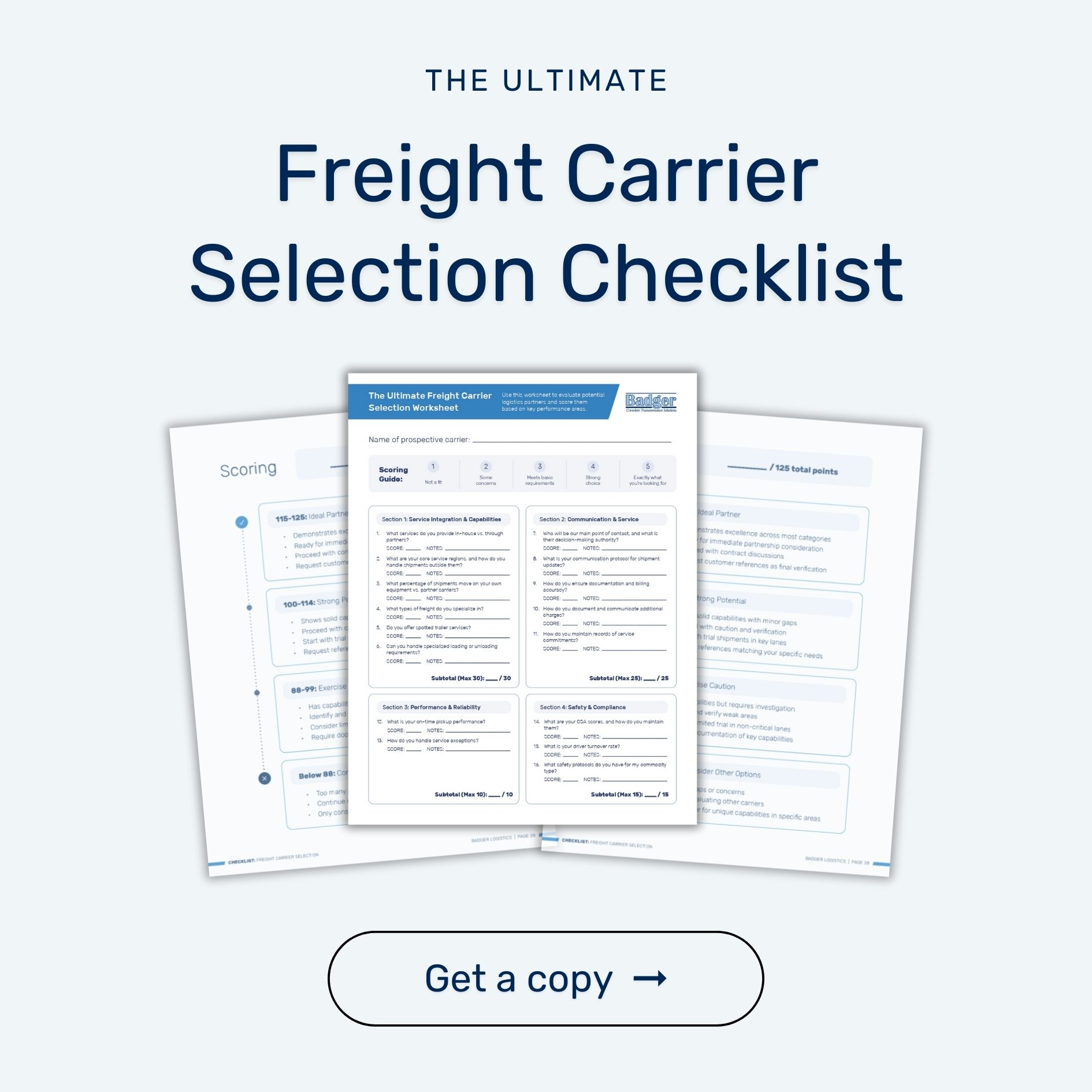Key takeaways
- A specialized carrier network is non-negotiable. Standard carriers often lack adequate insurance coverage ($250,000+) and specialized equipment (Conestoga trailers) necessary for protecting valuable industrial machinery from damage during transit.
- Coordination is more complex than standard freight. Successful high-value shipments require synchronizing multiple stakeholders, including manufacturing teams, crane services, on-site contacts, and installation crews, with failures potentially costing thousands in penalties.
- Communication must be proactive, not reactive. Automated tracking systems fail to meet the needs of complex shipments; hands-on account management with regular status updates and early problem identification prevents costly delays.
- A total cost evaluation extends beyond the rate quote. The true cost equation must factor in risk mitigation, potential damages, installation delays, and customer satisfaction impacts, not just the base transportation cost.
Badger Logistics specializes in complex industrial equipment shipping with proven success handling 3-5 weekly high-value shipments for manufacturers like Watertronics. Learn more about our Wisconsin shipping expertise or get a competitive rate quote to experience the difference a logistics partner experienced in high-value equipment transport can make.
A brief introduction
After nearly a decade of overseeing complex shipments at Badger Logistics, I've seen firsthand how the transportation of high-value industrial equipment requires a different approach than everyday freight.
The truth is that most carriers and brokers aren't equipped to handle the complexities that come with shipping custom-manufactured industrial machinery. Whether you're moving water pump systems like our partners at Watertronics, specialized manufacturing equipment, or other high-value machinery, you need logistics partners who understand that your cargo isn't just another load — it's the backbone of your business operations and customer relationships.
In this guide, I'll walk you through what truly matters when shipping complex industrial equipment, based on our real experiences coordinating thousands of specialized shipments across North America.
Why industrial equipment shipping is different
Before diving into best practices, it's important to understand why industrial equipment shipping presents unique challenges:
1. High-value, irreplaceable cargo
When you're shipping standard consumer products, a damaged or delayed shipment might be inconvenient. When you're shipping custom-built industrial equipment worth $250,000 to $1,000,000 per unit, the stakes are dramatically higher.
Take our experience with Watertronics, which manufactures custom water pump systems for golf courses, agricultural operations, and commercial properties. Each of their systems is custom-manufactured to customer specifications, meaning they can't simply pull a replacement off the shelf if damage occurs. The equipment itself represents just part of the cost — installation delays can cascade into thousands of dollars in penalties, idle labor costs, and damage to customer relationships.
2. Complex coordination requirements
Standard shipping involves moving from point A to point B. Complex industrial equipment shipping often involves coordinating with:
- Manufacturing teams
- Sales representatives
- On-site contacts
- Crane services
- Installation crews
- Specialized handling equipment
When one component is out of sync, the entire operation can fail. I've seen cases where a single missed communication resulted in a $5,000 crane rental sitting idle for a full day.
3. Non-standard shipping specifications
Most industrial equipment requires specialized handling:
- Weather protection beyond standard tarps
- Equipment that exceeds standard dimensions
- Weight considerations that limit carrier options
- Cargo insurance requirements exceeding industry norms ($250,000+)
- Unusual delivery locations (golf courses, construction sites, etc.)
With these unique challenges in mind, let's examine the best practices for ensuring successful specialized shipments.
Best practices for complex industrial equipment shipping

Let's run through a few things to keep in mind if you're a shipper.
1. Build a specialized carrier network
- Standard practice: Many shippers rely on a digital broker or a small pool of general carriers.
- Better approach: Curate a specialized network of carriers specifically equipped for your unique cargo.
At Badger Logistics, we've developed a network of trusted carriers with specific capabilities that most carriers simply don't have. For Watertronics, this means carriers with Conestoga trailers (rather than standard flatbeds with tarps) and cargo insurance of at least $250,000 per shipment.
Some specifics to consider when building your carrier network:
|
Protip: Don't just take a carrier's word that they can handle your freight — ask detailed questions about their experience with similar shipments. A well-vetted, specialized carrier network is your first line of defense against shipping disasters.
2. Implement a robust coordination System
- Standard practice: Basic pickup and delivery scheduling.
- Better approach: Establish a communication framework that connects all stakeholders.
For complex industrial equipment, successful delivery requires coordination between multiple parties:
- The manufacturer's production team
- Sales representatives who understand customer expectations
- Delivery site contacts who may have limited receiving experience
- Crane services at origin, destination, or both
- Installation crews working on tight timelines
- Carriers with specialized equipment
We recently coordinated a 12-pump project for Watertronics that involved pickups and deliveries across multiple states, tracking both new equipment deliveries and returned old pumps at each stop. This required a detailed coordination system that ensured everyone involved had the right information at the right time.
Establish communication protocols for each stakeholder:
|
The most successful shipments occur when everyone is working from the same playbook.
3. Invest in Proactive Communication
- Standard practice: Reactive updates when issues arise.
- Better approach: Hands-on account management with proactive communication.
The difference between good and great in specialized shipping comes down to communication. We maintain regular morning check-in calls with customers like Watertronics to stay on top of shipment status and upcoming needs.
For complex freight, automated tracking alone isn't enough. Your logistics partner should provide:
|
In one recent case, we had a Watertronics shipment that encountered a delay during loading due to crane maintenance. Rather than simply accepting the delay, our team immediately notified everyone in the delivery chain and worked with the carrier to develop a recovery plan. Despite loading at 11 AM (several hours behind schedule), the carrier still made an 8 AM delivery in Virginia the next morning—meeting a critical installation timeline. Get the full details in our success story.
4. Prepare for unique site conditions
- Standard practice: Assuming standard loading/unloading facilities.
- Better approach: Detailed site assessment and preparation.
Many industrial equipment deliveries occur at locations without proper receiving facilities. Golf courses, construction sites, and undeveloped properties often lack loading docks, forklifts, or even paved surfaces.
For shipments to non-traditional delivery sites:
|
Generally speaking, the more information you can gather about delivery conditions, the better you can prepare your carrier for successful delivery.
5. Plan for fast-response options
- Standard practice: Standard lead times of 24-48 hours.
- Better approach: Develop capabilities for same-day response when needed.
Manufacturing schedules rarely align perfectly with shipping timelines. When production runs long or customer timelines shift, you need logistics partners who can respond quickly.
At Badger, we regularly arrange transport for Watertronics within hours of notification. This requires:
|
Your logistics partner should be able to tell you exactly what their capabilities are for emergency response times. If they can't commit to specific timeframes for urgent shipments, they're likely not equipped for industrial equipment logistics.
6. Prioritize proper protection
- Standard practice: Standard tarping for weather protection.
- Better approach: Specialized equipment and protocols specific to your product.
Weather damage is one of the leading causes of industrial equipment claims. Unlike standard freight, industrial machinery often contains sensitive components that can be damaged by moisture, temperature fluctuations, or road debris.
For Watertronics' pumping equipment, we ensure carriers use Conestoga trailers rather than standard flatbeds with tarps. These accordion-style covered trailers provide superior protection against the elements while still allowing for top-loading.
Beyond weather, consider:
|
Document these requirements clearly and ensure they're communicated to every carrier handling your freight.
7. Understand the true cost equation
- Standard practice: Selecting carriers primarily on quoted rates.
- Better approach: Evaluating the total cost of transportation, including risk factors.
With high-value industrial equipment, the lowest quote rarely represents the lowest total cost. A carrier that saves you $200 on transportation but increases your risk of a $50,000 claim isn't actually saving you money.
When evaluating shipping costs for specialized equipment, consider:
|
For Watertronics, rate competitiveness matters, but never at the expense of reliability or proper equipment. Their calculation includes the potential costs of delayed installations, which can run into thousands of dollars per day.
Real-world application: shipping for Watertronics
Let me share a concrete example of these principles in action through our work with Watertronics. Download the full case study here.
|
Watertronics manufactures custom water pump systems valued between $250,000 and $1,000,000 per unit. Their shipments require:
Through our partnership, we've implemented:
The results speak for themselves: 3-5 successful shipments weekly across North America, with a consistent record of on-time performance despite the complex requirements. |
Finding the right logistics partner
Not all logistics providers are equipped to handle specialized industrial equipment. When evaluating potential partners, ask these questions:
|
The right partner will have substantive answers to these questions and will ask you detailed questions about your specific needs.
It's not just freight—it's your reputation
When you're shipping complex industrial equipment, you're not just moving freight—you're delivering on promises to your customers. The right logistics approach protects more than your equipment; it protects your reputation and relationships.
As Paul Oberg, Production Manager at Watertronics, puts it: "Since we've been with Badger, logistics is one less thing I have to worry about... When they say they'll have a truck there at 7 AM, you can count on it being there at 7 AM—and in this industry, that reliability is worth its weight in gold."
Shipping specialized industrial equipment requires specialized logistics solutions. By focusing on the seven best practices outlined in this guide, you can build a transportation strategy that delivers not just your equipment, but peace of mind.
Talk to us if you need a logistics partner who can handle complex, high-value loads.






